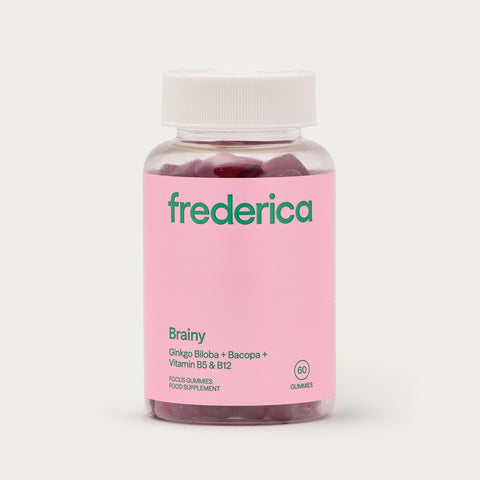When we talk about concentration, we already know the rules: have a schedule, write down our tasks, keep our cell phones away... But let me ask you this: if we already know, in theory, what we have to do to stay focused, why is it still so difficult? We know that distractions abound and the pace is fast, and at some point we forget where we left our keys, and that important task has also been forgotten. But let's start here: the secret to being more focused is to see yourself as a whole—mind and body—and not just as someone with a to-do list.
Why do we lose focus?
Lack of concentration can come from many sources: from sleepless nights to poor sleep hygiene, stress, or nutritional imbalances. Our ability to focus on a task or goal isn't driven solely by motivation or willpower (if that were the case, perhaps we'd all go to the gym more often!); it depends above all on what's happening chemically in our brain.
Our brain processes involve words you may already be familiar with, like dopamine or acetylcholine. When any of these neurotransmitters are missing or imbalanced, our ability to maintain focus diminishes. This is why it's so important not to be so hard on yourself when you're having trouble finishing tasks or following through on promises: something in your body may need attention, and it might be time to look at your difficulty concentrating from a broader perspective.
Could it be ADHD?
Attention Deficit Hyperactivity Disorder (ADHD) is a neurodevelopmental disorder that can manifest in a variety of ways and at any age, although it is often diagnosed in childhood. It's normal to wonder if you have this disorder if you experience recurring difficulties maintaining focus and attention for long periods, impulsive actions, or a constant feeling of being disorganized and lost.
If you experience these symptoms, it's important to reflect on their impact on your daily life. Difficulty focusing, for example, may be affecting your professional performance or personal relationships. Furthermore, ADHD can be related to other conditions, such as anxiety or depression, making a careful clinical evaluation even more important. Diagnosis of this disorder is often made through a detailed psychological evaluation, which involves clinical interviews, specific tests, and observation of behavior over time.
What is the first step to being able to concentrate?
Our grandparents had a profound understanding of the impact of nutrition on mental and physical health. Before modern medicine, the power of food, plants, teas, and infusions was valued... As a psychologist, I believe this wisdom remains relevant and can be integrated not only as an element of the therapeutic process, but also into our current routine. We are our thoughts and emotions, yes, but we are also what we eat, the way we nourish ourselves, and how we care for ourselves. Mental health is multifactorial, so it's important to understand that we are a whole: the body affects the mind and vice versa.
As a psychologist, I can offer you several "first-step" options to help you focus more easily. If you've already ruled out potential health issues with your doctor or psychologist, you may just need to learn how to truly take care of yourself. Find a physical activity you enjoy and invite your friends or significant others to join you—make it a habit, your personal routine. Make sure your body is well-nourished, as this directly affects memory and brain function. Vitamins like B5 and B12 are essential for neuronal health and contribute to reducing fatigue and maintaining normal nervous system function. Preparing colorful smoothies for breakfast seems appealing on many levels, but remember that sometimes a multivitamin can make your life easier and help you avoid memory lapses and concentration difficulties. Don't forget that the foods we eat today don't have the same composition and richness as those eaten by our grandparents.
Getting quality sleep can also be an excellent first step: have you been sleeping well? A good night's sleep is essential for your brain to consolidate the day's information and maintain healthy functioning. Methods like the Pomodoro method can also be useful when you need to stay focused—divide your work into 25-minute periods and take breaks in between. And of course, don't neglect the wisdom of our grandparents in your quest for a calmer and more focused mind. Herbs like bacopa monnieri and ginkgo biloba improve memory, reduce anxiety, and promote the delivery of oxygen and essential nutrients to the brain.
In short, the path to greater concentration and focus is a process that involves more than simple to-do lists or discipline. The key is understanding that mind and body are interconnected, and that our cognitive performance is profoundly influenced by our physical, emotional, and mental health. If you frequently experience difficulty maintaining attention, don't forget that there are ways.
Text written by:
Dr. Ana Sofia Fernandes is a clinical psychologist specializing in areas such as ADHD, perinatal mental health, early childhood interventions, family mediation, dyslexia, child and youth protection, family intervention, parenting skills assessment, and forensic psychology. Her integrated and empathetic approach is aimed at promoting the mental and emotional well-being of the families she serves.
The Science of Focus: How to Improve Concentration

More Blog Articles

Do you tend to accumulate tasks? Are there clothes scattered around the room? How long has your life been in chaos? Don't worry. There is always time to learn more...

When we talk about concentration, we already know the rules: have a schedule, write down our tasks, keep our cell phones away... But let me ask you this: if we...































